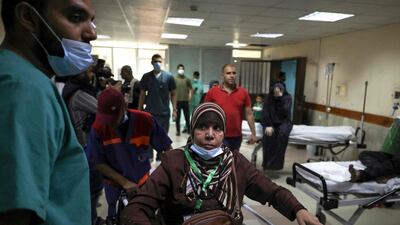Gaza's health sector, already overwhelmed by Covid-19 before the conflict and a lack of funds, is collapsing as the Israeli military presses on with its offensive, the enclave's health ministry spokesperson told The National on Monday.
“During the past few days our medical staff have been able to manage the flow of injured but while the aggression continues all our resources will be drained,” Health Ministry Spokesman Dr Al Qudra said.
The latest outbreak of violence began in East Jerusalem last month, when Palestinians clashed with police in response to aggressive Israeli police crackdowns on gatherings of worshippers during Ramadan, around the Al Aqsa mosque. Tensions were further inflamed by the threatened eviction of dozens of Palestinian families by Jewish settlers.
Hamas began firing rockets towards Jerusalem on Monday, triggering the Israeli assault on Gaza.
Within a week, 213 Palestinians have been killed in hundreds of air strikes on Gaza, including 58 children, with 1,442 people wounded, according to the Gaza Health Ministry.
Eleven people in Israel were killed in some of the 3,100 rocket attacks launched from Gaza. They included a five-year-old boy and a soldier.
“The situation of the health sector in Gaza Strip is disastrous, if international organisations don't step in to provide us with the missing and vital equipment and medications … we will collapse”, said Dr Mohammed Abu Salmiya, the general director of Gaza’s largest medical centre, Al Shifa Hospital.
The hospital has now reached 70 per cent of its capacity and had to increase the number of beds in the intensive care unit from nine to 32.
“We are working under enormous pressure and this took its toll on our medical staff who were already exhausted because of the coronavirus outbreak,” Dr Abu Salmiya said.
The Israeli siege of Gaza has tightened since last week's offensive began, and closure of all vital border crossings has only worsened the situation, according to the health ministry spokesperson. This is especially the case for patients who are critically ill or injured, who need to be transferred outside the Gaza strip to be treated.
Dozens of life saving operations have been performed during the past week, he added.
The siege has also affected the supply of fuel into the enclave and led to severe power shortages that could lead to a total power cut within the next few days.
"Gaza's only power plant could shut down completely within two to three days because of the lack of fuel," Mohammed Thabet, the spokesman of the power plant, told The National.
“We can’t provide fuel to the station because of the border closure by Israel,” he said.
As the military offensive started, Israel closed the borders of Gaza, including Karm Abu Salem crossing, the only commercial border crossing between Israel and Gaza, south of the Gaza Strip.
“If the power plant shuts down the situation will be catastrophic, especially for vital facilities which work on full capacity such as hospitals,” Mr Thabet warned.
“We enjoy three hours of electricity per day and the generators might soon stop working, because such a huge hospital on near full capacity depends on them for power for long hours,” Dr Abu Salmiya said.
The hospital is also suffering from severe shortages in medicine, such as antibiotics and anaesthetic drugs and surgical sutures, according to Dr Marwan Abu Saada, head of the surgery department in the hospital.
Hospital staff said 30 per cent of the injured, who suffer from fractured limbs, might face a delay in treatment that could leave them with physical disability.
“At the hospital we only have two machines to treat and fix fractured limbs, one of those machines is broken, so we are relying on one machine now. The delay in treating the patients can result in gangrene and amputation,” Dr Abu Saada said.
“Our medicine storage will last for only one week”, he added.
In the hospital’s bloodied and crowded rooms and corridors, relatives of the injured waited with anguish and hope.
“Our residential building was fully destroyed at dawn without initial warning,” Mona Abdallah Faraj said as she waited at her injured daughter’s bedside.
“Rescue teams saved us from under the rubble of our three story building,” Mrs Faraj said, herself bruised and injured after the bombing. Her child had to undergo three life-saving operations on her head and back, she added.
“The most terrifying moments were as we lay down unable to move under tonnes of rubble, waiting helplessly for someone to find us and thinking that we might die slowly, waiting,” she said with shock.
“In Gaza we either survive or die. There is no good life in between,” she said.
In the corridor, Raed Hasan Eishkuntana was waiting in shock as he visited his injured brother who lost his wife and four children aged two, three, four and seven respectively, when their four story building collapsed on them.
“These children did nothing wrong and even their small bodies were charred. But we consider them martyrs for Jerusalem,” Mr Eishkuntana said.
“Jerusalem deserves more than that,” he said.
















